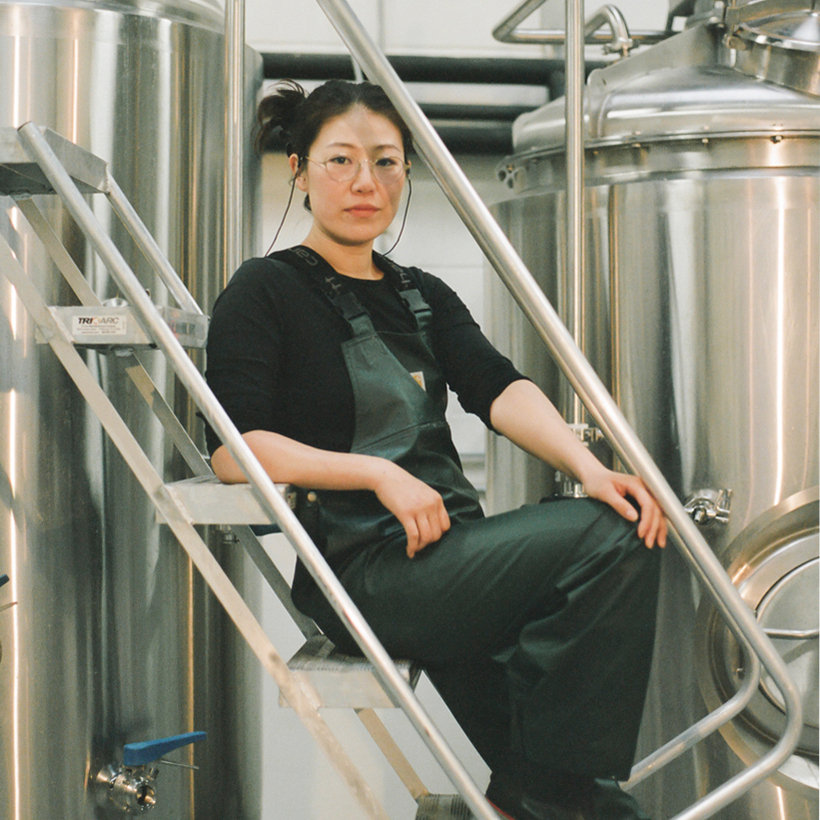On the edge of Greenpoint, Brooklyn, is Hana Makgeolli, a brewery and tasting room in a league of its own. Opened in 2020, the airy, industrial space is the first brewery of sool (Korean alcohol) in America. Variations of sool include takju, yakju, and, perhaps the best-known Stateside, makgeolli—a Korean rice wine that looks like milk. It’s most commonly thought of as a sweet, gulp-ready beverage sold in green plastic bottles. Hana Makgeolli’s founder, Alice Jun, is working to change that.
“The daily misconception we are fighting is that makgeolli should be light and sweet,” says the 30-year-old Jun. “But in no other beverage category do you see wine or alcohol fermented up to 20 percent A.B.V., then diluted by more than 75 percent.” Unlike traditional Korean rice wine, the kinds sold in America are cheap and sweetened with aspartame. “This was the only type imported into the U.S.”

Born and raised in Santa Maria, California, Jun moved to New York City in 2011. She worked as a consultant at Deloitte for six years, then, in 2016, started brewing rice wine at home as a hobby. With her business partner, John Limb, she launched her sool brand four years later.
Jun wants to bring sool back to its roots. She only ferments organically grown rice and nuruk—a wild, not lab-grown, fermentation starter—and stays as close to old-world methodologies as possible. Not just Hana Makgeolli’s founder but also its day-to-day producer, Jun handles “ingredients in a gentle way, because the tradition of sool brewing is a domestic tradition. Everything was traditionally done by hand.”

The day we met, Jun wore hiking boots and pants and a thermal layer under a half-zip to stay warm in the very cold production room. “On brew days, I’m soaked and covered in rice.”
Compared to wine, sool’s flavors are more tropical. “Banana or pineapple or melon, these super rich and especially fragrant fruits,” explains Jun. While rice has no tannins, that mouthfeel can be made with ingredients like chrysanthemums, hydrangeas, schisandra berries, or elderflower. What excites Jun is the fact that people are now using wine language to describe sool’s flavors. Previously, “Makgeolli was never viewed as a category worthy of discussions in this way.”
“On brew days, I’m soaked and covered in rice.”
Her sool, which has “enough acidity to balance out fat or heat, and also keep your palate clean,” is best consumed with food. Hana Makgeolli’s premium bottles can be seen on menus at Michelin-starred New York restaurants such as Atomix and Olmsted, and pair well with many cuisines, such as Chinese, Mexican, and Vietnamese. “One of my favorite things is to drink our sool with fruit and cheese.”

Jun is a mesmerizing speaker, turning scientific processes into vibrant stories. Introducing a mostly foreign product demands this. “It’s a matter of survival,” she explains. She credits this ability to her former life as a consultant. But Jun’s storytelling feels deeper than something polished by corporate origins. She nearly cries when explaining the company’s ultimate goal: “We hope this makes you proud when you drink it.”
Sophie Mancini is a New York-based writer, editor, and creative consultant

